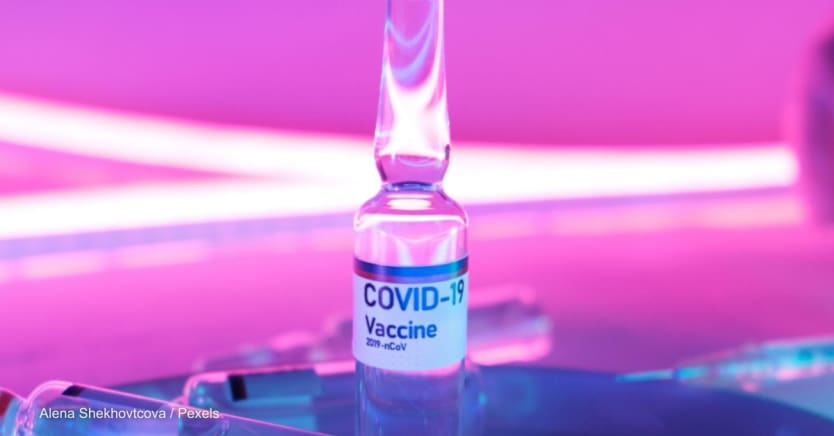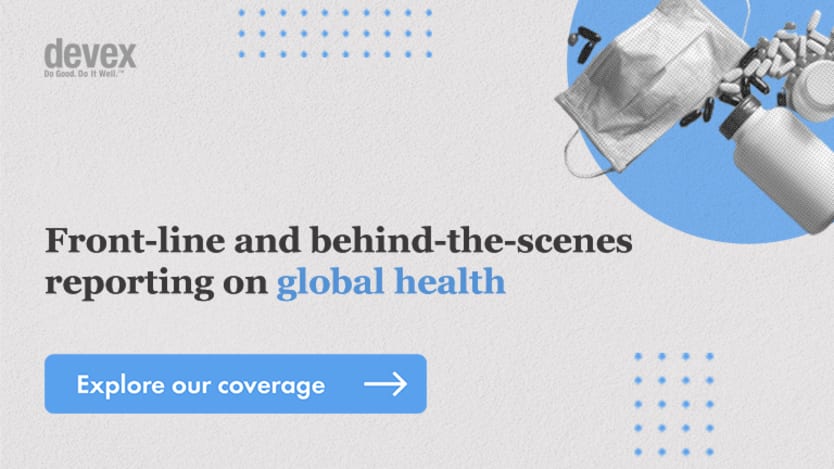Prospects for local manufacturing of COVID-19 vaccines in Africa

The African continent imports 99% of the vaccines its populations use. The dangers of this have magnified during the pandemic, as political and capitalistic forces outside the continent left its countries without adequate supplies of life-saving COVID-19 vaccines.
Sign up for Devex CheckUp
The must-read weekly newsletter for exclusive global health news and insider insights.
“That situation needs to change,” said Dr. John Nkengasong, director at Africa Centres for Disease Control and Prevention, during a news briefing in late December. “The next pandemic … the way we fight it on the continent will be very different from the way we fought this pandemic.”
Local manufacturing of COVID-19 vaccines has ramped up in recent months in low- and middle-income countries and is slated to increase this year — though some newly announced agreements will take time before they materialize into actual vaccines.
Following a rallying cry from public health leaders for the increase of manufacturing of vaccines, Africa CDC launched the Partnerships for African Vaccine Manufacturing in April 2021, which has a long-term vision of building up the vaccine manufacturing capacity across the continent so that by 2040, 60% of all vaccines used on the continent are produced within African nations — with interim goals of 10% by 2025, and 30% by 2030.
“This is not just about COVID-19. There will always be more disease outbreaks and epidemics. That’s why local production of vaccines is so critical,” said Dr. Tedros Adhanom Ghebreyesus, director-general at WHO, during a stakeholder meeting on vaccine manufacturing in December.
Algeria, Egypt, Morocco, Rwanda, Senegal, and South Africa have either signed agreements or memorandums of understanding for COVID-19 vaccine manufacturing or begun production. Côte d'Ivoire, Ghana, Kenya, and Nigeria have also expressed interest in vaccine manufacturing, according to Nkengasong.
“By the end of [2022], we will begin to see a change in the availability of vaccines on the continent. Not just for vaccines that are produced on the continent, but also the overall supply chain for vaccines on the continent,” he said.
Aspen Pharmacare of South Africa has led the charge. As of last month, it reported to have partially produced 120 million doses of the Johnson & Johnson COVID-19 vaccine. The African Union signed an agreement for 400 million doses, which are partially manufactured at Aspen through the “fill and finish” stage — the final step of the process where the substance of the vaccine is sent to the plant to be put in vials and distributed.
In late November, the companies announced nonbinding terms for a potential licensing agreement, which would allow Aspen to determine the price and distribution of the vaccine. Aspen announced in October that it aims to increase production to 1.3 billion doses per year.
In July, Pfizer signed a letter of intent with South Africa’s Biovac Institute to partially manufacture its COVID-19 vaccine for distribution within the African Union. According to a Pfizer spokesperson, Biovac’s Capetown facility was incorporated into the supply chain at the end of last year with expectations that the facility will begin manufacturing finished doses this year. Facilities in Europe will send Biovac the vaccine substance to be put in vials. At full operational capacity, the annual production is expected to be over 100 million doses.
In June, the World Health Organization and its partners announced the creation of a technology transfer hub for messenger RNA COVID-19 vaccines in South Africa. The hub aims to develop its own replica of the mRNA COVID-19 vaccine created by Moderna. But the company has declined to be a part of the hub, so the hub has to develop the technology independently, by using information available in the public domain.
“As much as that slows things down, it also is a tremendous opportunity to build that know-how internally in Africa. At the end of the day … having the development done in the developed world and always transferring it, is not the answer to this,” said Charles Gore, executive director of the Medicines Patent Pool, during the stakeholders meeting.
NPR reports Martin Friede, vaccine research coordinator at WHO, as saying that the hub chose to replicate Moderna because the company has “reiterated on several occasions that they will not enforce their intellectual property during the pandemic.”
The hub plans to initiate the training of 10 manufacturers. Calls for expressions of interest from manufacturers will be reviewed early this year. The hub will start production of a vaccine for clinical studies and conduct phase 1 trials. The next step would be to establish a second-generation mRNA vaccine technology providing advantages over the current candidate, as well as working to adapt the technology to emerging strains and vaccination strategies. The Pan American Health Organization has also set up two hubs in Argentina and Brazil.
In October 2021, Rwanda and Senegal signed an agreement with BioNTech — the company producing an mRNA COVID-19 vaccine with Pfizer — to create full production mRNA vaccine manufacturing facilities under license. This would go beyond fill and finish and contract agreements. The company said construction will start in mid 2022. Eventually, the first production line will produce up to about 50 million COVID-19 vaccine doses per year for distribution on the continent. The final decision about the location for the first BioNtech mRNA manufacturing site has not been made yet, according to a company spokesperson.
“We expect to turn over this factory, at pre-agreed terms and conditions to the respective local partners in a very short period of time,” said Holm Keller, executive chairman and CEO at KeNUP Foundation, which represents BioNTech.
Aspen's COVID-19 vaccine licensing deal a 'game changer' for Africa
“This now means that Africa has its first COVID vaccine. It means that we would now determine both the availability, allocation, and distribution,” says a senior executive at Aspen Pharmacare.
Institut Pasteur de Dakar is planning to host a regional manufacturing hub in Senegal, and there is already a vaccine construction site for a facility to build mRNA vaccines, Nkengasong said. Senegal will start producing COVID-19 vaccines in the next eight to 12 months, according to Nicaise Ndembi, senior science adviser to the director of Africa CDC.
Moderna also announced plans to build an mRNA therapeutics and vaccine manufacturing facility on the African continent — but has yet to decide on a country. The company said the plant is expected to produce up to 500 million vaccine doses annually, including for COVID-19 and other conditions.
“We are currently doing our own due diligence to make the final site selection,” John Lepore, senior vice president of government engagement at Moderna, said in early December.
Egypt is producing its own COVID-19 vaccine, named “COVI VAX,” which has started phase one clinical trials, said Khalid Atef Abdel-Ghaffar, Egypt’s minister of higher education and scientific research. As of early December, the country has also locally produced 25 million doses of Sinovac at the state firm Vacsera, which has largely served domestic needs. It is currently producing 2.5 million doses monthly, with an expected additional 1.5 to 2 billion doses yearly in its new line of production, which is expected to be operational in 2022, he said.
The Russian Direct Investment Fund, which is Russia’s sovereign wealth fund, signed an agreement with Egyptian manufacturer Minapharm Pharmaceuticals to produce the Sputnik V vaccine. The facility is expected to “initially supply over 40 million doses per year.” The facility has successfully completed the tech transfer for the end-to-end manufacturing of the vaccine, said Shaheer Bardissi, co-CEO at Minapharm.
Morocco’s Sothema laboratory is producing Sinopharm vaccines, which the company said will be on the market very soon, to serve both domestic demand and to export across the continent. It is expected to produce 5 million doses per month.
Algeria started producing Sinovac vaccine doses in late September 2021.
Bharat Biotech International Ltd., which produces a COVID-19 vaccine, is also examining locations in Africa.
“We are also actively reviewing countries to make potential investments for vaccine manufacturing facilities. We are in the selection process right now, but I think in the few weeks, or months to come, we do hope to make an announcement about our own selection of a country for making vaccines in Africa,” said Sai Prasad, president of quality operations at Bharat.

Search for articles
Most Read
- 1
- 2
- 3
- 4
- 5









